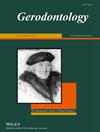Quality of Life and Oral Function in Patients With Jaw Defects Following Oral Tumour Surgery
Abstract
Objectives
To evaluate various oral functions in patients with jaw defects after oral tumour surgery and to clarify factors associated with their quality of life (QoL).
Background
In patients with jaw defects, oral function and QoL are severely impaired. No studies have evaluated oral functions of patients with jaw defects and examined their relationships with QoL.
Materials and Methods
The study participants were 72 patients (mean age: 70.7 ± 10.1 years, range 48–93 years) who underwent prosthetic treatment with a removable denture to treat a jaw defect following oral tumour surgery. Masticatory performance, maximum bite force, oral dryness, tongue pressure, and tongue-lip motor function (oral diadochokinesis, /pa/, /ta/, /ka/ syllables) were evaluated after prosthetic treatment. The Japanese version of the EORTC QLQ-H&N 35 was used to assess QoL. From the QoL assessment, the “Pain”, “Swallowing”, “Sense”, “Speech”, “Social eating”, and “Social contact” scales were extracted. Multiple regression analysis was conducted using each QoL scale as the dependent variable and oral functions as explanatory variables.
Results
In the multiple regression model for “Swallowing”, the oral diadochokinesis /ta/ was a significant explanatory variable. In the model for “Sense”, tongue pressure was a significant explanatory variable. In the model for “Speech”, age was a significant explanatory variable. In the model for “Social contact”, tongue pressure was the significant explanatory variable.
Conclusion
In patients with jaw defects following oral tumour surgery, lower tongue pressure is associated with poorer QoL in a wider range of ways than other oral functions are.

 求助内容:
求助内容: 应助结果提醒方式:
应助结果提醒方式:


